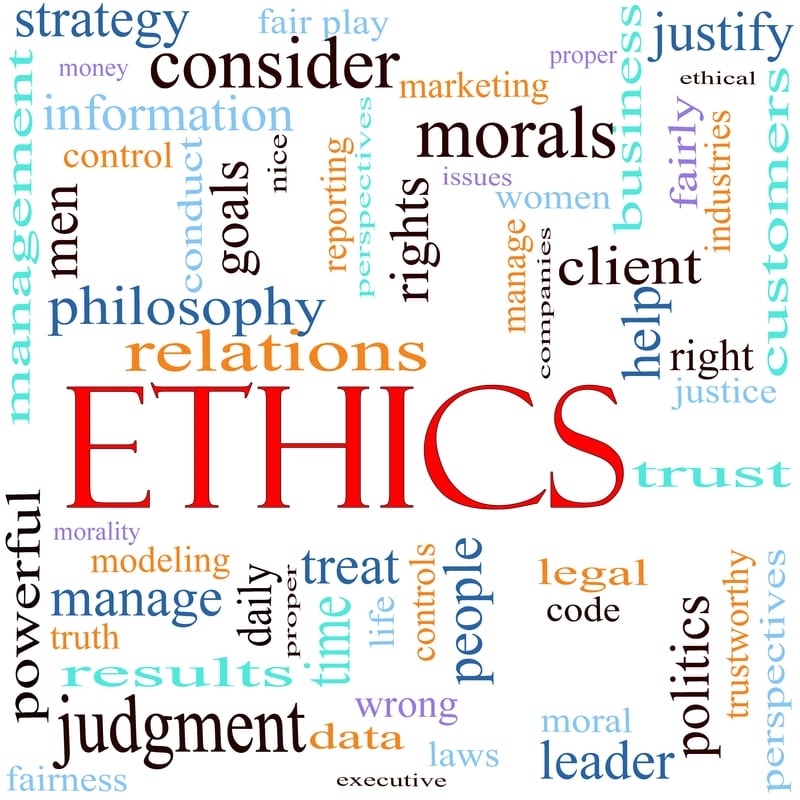Strong Point’s Leadership Rule #17: Wear Your Moral Compass on Your Sleeve
Thomas Jefferson, one of the founding fathers of our nation, and one of the five drafters of the Declaration of Independence is quoted as saying:
“Money, not morality, is the principle commerce of civilized nations.”
-Thomas Jefferson
It goes without saying that money is the primary principle of commerce itself. In your expedition through corporate America, I am sure you can provide your own travel chest of stories that offer evidence to Jefferson’s claim made long ago. Our work feeds our minds, our souls and our children. Sometimes, though, the money and our efforts to produce it come at the expense of our morality. I’m sure you’ll agree that there’s a relationship between money and morality. Less of one often degrades the presence of the other.
The exercise of writing this blog: #25RulesNeededtoLead is both a personal and professional effort to define a model of leadership, as I live, work and learn. I remain committed to this effort so that I’m able to articulate and develop sustainable qualities and disciplines of leadership for Strong Point Solution Teams and Strong Point’s customers and partners. I want people to know Strong Point’s methods and style of leadership, and that my colleagues and I strive to strengthen and advance our leadership capability every day. Strong Point works to improve and reinforce the leadership investment of its clients continually. Leadership investments are still and ever out-matched, five-to-one, by business and technology budgets. In most transformation engagements in which Strong Point participates, focused attention on leadership capability and advancement is the single stand-out differentiator that yields step-changing, wow-factor, “this is really different “results.
A key ingredient to Leadership Capability is morality. Succeeding without sacrifice, telling the truth, doing the right thing, or serving others, injures people, the planet and profits in both seen and unseen ways. Yet we’ve all experienced people and teams who don’t have a moral compass to guide their thoughts, actions, or decisions. Many business leaders and professionals shy away from even saying the word morals in the workplace, let alone declaring moral behavior as a foundational business imperative. It’s as if our constitutional heritage and upbringing mindfully force us to keep church and state separate. We errantly relegate the discussion of morals, or the active development of them, to the realm of the unspoken where conversations about politics, religion and sexual orientation remain taboo.
I understand that people most often couple morals and moral behavior to religious beliefs. I often hear some variation of the sentiment “there is no good without God,” and I have often felt those feelings and even shared that belief. I’m also an American citizen. I was raised with a value system that promotes religious freedom and tolerance by keeping all things “church” out of business and politics. Strong Point, in all of its endeavors, works with integrated business teams whose members come from all walks of life and all varieties of faith. I believe this separation of church and state enables us to work together with dignity and respect effectively.
Yet there’s evidence to support the notion that morality exists in nature and in human beings without religion. In researching this blog, I happened across an excellent article by Gad Saad, Ph.D. , with similar title: Morality Exists Despite Religion. Saad’s article published in the April 30th, 2012 edition of Psychology Today, basically says that religion teaches us HOW to be moral, not morality itself. There are as many religious beliefs, as there are people. Each teaches and models a different way to live a virtuous and honorable life.
I love Saad’s thoughts that intimate:
“…to repeatedly utter the banal canard that morality is outside the purview of science is astonishingly false. Innumerable books and scientific articles have been written to explain the evolution of morality, empathy, kindness, cooperation, altruism, parental love, romantic love, love for one’s friends, and numerous other emotions that constitute integral elements of our moral fortitude.”
And yet it’s the absence of morals that lead most professionals to mistrust their leaders, and ultimately leave organizations that employ them. A December 12th, 2013 Forbes article written by contributor Glenn Llopis, lists the seven reasons employees don’t trust their leaders. They are:
- Lack of Courage
- Hidden Agendas
- Self-Centered
- Reputation Issues – Integrity Issues
- Inconsistent Behavior
- Don’t get their hands dirty
- Lack a Generous Purpose
In this list, you can see and hear the many examples of colleagues who vehemently disagree with your or another’s view, and yet fail to have the difficult conversation that works to find common ground. Smoothing and synthesizing self-centric and company-centric views held by disparate project team members into common goals, a shared vision, and team-derived moral ways of working, is one of Strong Point’s core reasons for being. Strong Point focuses its engagement efforts on leadership development because, ultimately when all else is working, like systems and processes and automation tools, people get hung up on themselves. I believe we all struggle with objectifying our behaviors and morals and putting them boldly, and vulnerably out-in-the-open, for the sake of examining them, healing them, and helping others.
Linda Hill, a professor of Business Administration at Harvard Business School, says the most overlooked leadership skill is a moral compass. In her Jan 11th, 2007 article called The most overlooked leadership skill? Having a moral compass, Ms. Hills explains that:
“It is a false assumption that leaders enter their careers with a fully developed moral compass. It’s not that our leaders don’t have values; they do. They just don’t know what they are, much less how to use them to work through the trade-offs associated with making ethical judgments.“
Part of Strong Point’s Leadership Methodology includes Team Setting. Part of Team Setting includes defining morals and more explicitly defining how individuals team members, and the team as a whole, enacts and strengthens them. The table below shows an example set of Core Team Morals and how a team defines and defends them.
| Core Team Morals | How We Define Them | How We Defend Them |
|---|---|---|
| Tell the truth with purpose and perspective. | We don’t maintain different versions of the truth. We maintain one single truth. | Our actions have verifiable foundations in fact. |
| Do not talk about others; only speak to others. | We never utter words that can cause harm to another. We don’t say things about others that we’ve not already said directly to them. | We act as if everyone is listening to everything we say, all the time. We hold no hidden agendas or conversations. |
| Own up to mistakes, faults and failures. | If we make a mistake, we name it, and own it and work to make it right. | We ensure the integrity of our work by working with others and having witnesses to our efforts. |
| Treat others with dignity and respect. | We do not lose control of our emotions. We don’t shame, blame, dismiss, disparage or criticize others. If we do, we quickly work to make amends. | When we are frustrated with another, we ask questions and offer assistance and insights into our perspective. We use a team facilitator to air and resolve differences. We decide as a team how to resolve conflicts. |
| Maintain integrity: Congruence between words and actions. | We don’t say one thing and do another or vice versa. | We maintain a strong relationship with a team counselor and/or advisor who regularly audits our actions and provides alternatives to destructive patterns. |
| Keep promises and hold others accountable to commitments. | We declare and document our obligations to each other. | We define clear consequences for missed commitments and follow-through with these consequences with equanimity. |
| Make wise and thoughtful decisions. | We don’t work in a vacuum. We test our thinking and vet our choices. No decision is a surprise. | We collectively derive our decision-making criteria and publish and record our decisions. |
| Exhibit perseverance in the face of struggle and challenges. | We don’t give up on ourselves or on others. We keep renewing our efforts to support our relationships and our goals. | We’re open about our struggles, and we ask others for help when it’s needed. We forgive each other for the hardships endured while working together. |
| Hold others in equal stature to ourselves. | We think about others as often as we think about ourselves. | We build in service to each other in every working day and deliverable. |
Few companies actively define and defend morals and moral behavior. Such work is often considered deeply personal, spiritual or otherwise outside the realm of professional best practices.
A June 06 2011 Harvard Business Week article written by Bill George, called Why Leaders Lose Their Way discusses how powerful people lose their moral bearings.
“…leaders know they are ultimately responsible for the lives and fortunes of people. If they fail, many get deeply hurt. They often deny the burdens and loneliness, becoming incapable of facing reality. They shut down their inner voice, because it is too painful to confront or even acknowledge; it may, however, appear in their dreams as they try to resolve conflicts rustling around inside their heads.”
Strong Point uses Team Setting to define and defend morals and moral action. It’s one very effective way to diffuse the stress of leadership, strengthen the cohesiveness of a working team, and ensure ethical outcomes. The US National Institutes of Health states that ethical action involves seeing an opportunity beyond one’s self to act, to care, and then to take action.
As recently as the end of October, a www.weforum.org article written by Matthew Biddle-Buffalo cites new research that shows: | Leaders who value morality outperform their unethical peers, regardless of industry, company size, or role. Leaders who prioritized morality had higher performing organizations with fewer turnovers, and their employees were more creative, proactive, engaged, and satisfied. |




